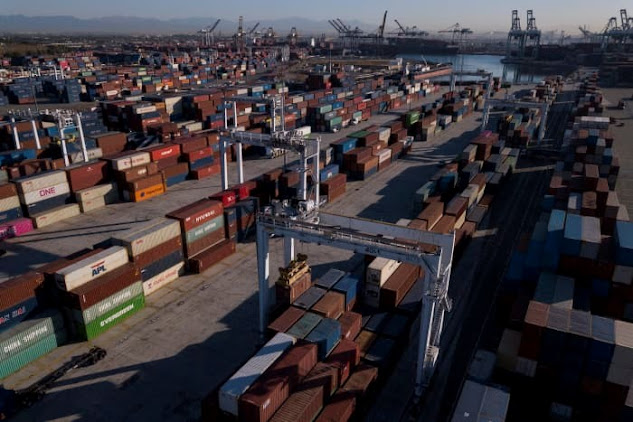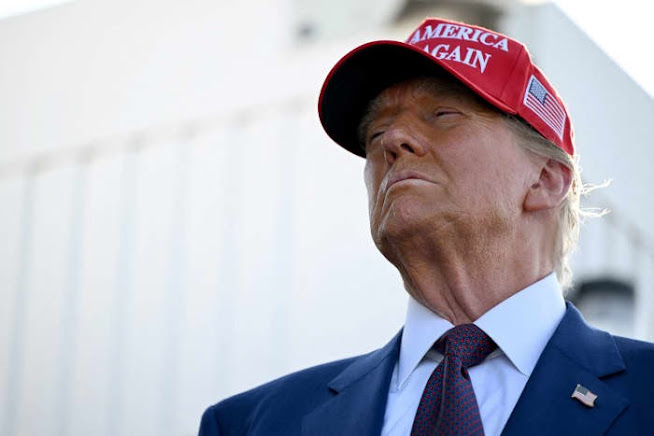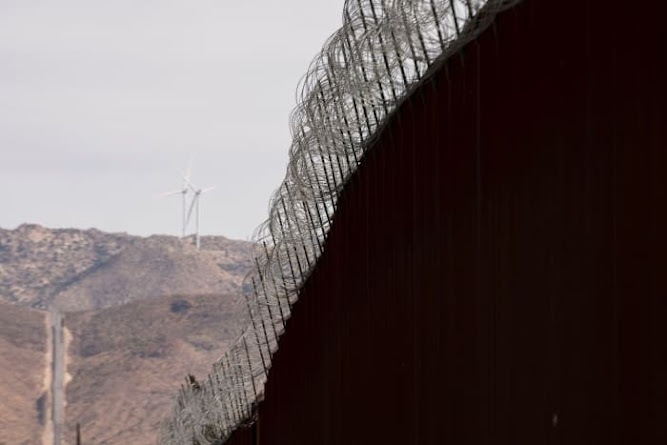Trump Fires Salvo on North American Trade Pact
President-elect signals intention to upend USMCA, wring concessions on immigration and fentanyl
By Jason Douglas in Singapore and Anthony Harrup and José de Córdoba in Mexico City
 New tariffs on Mexico, Canada and China could bring fresh disruption to the world economy. Photo: patrick t. fallon/Agence France-Presse/Getty Images
New tariffs on Mexico, Canada and China could bring fresh disruption to the world economy. Photo: patrick t. fallon/Agence France-Presse/Getty ImagesDonald Trump’s new tariff pledges send a clear signal that he wants to rewrite the terms of North America’s free-trade pact and follow through with plans to hit China with tariffs, demonstrating to allies and adversaries alike that he is serious about renewing confrontation over a global trading system that he believes costs the U.S. dearly.
On his Truth Social social-media platform on Monday, Trump said he would levy tariffs of 25% on imports of all goods from Mexico and Canada, accusing both countries of facilitating illegal immigration and fentanyl abuse in the U.S.
The Mexican peso fell 1.4% against the dollar in Asian trading Tuesday, while the Canadian dollar lost 1%.
He also promised to levy additional tariffs of 10% on Chinese imports, citing what he says is China’s failure to regulate the chemicals that go into fentanyl.
Many Chinese products are already subject to average levies of about 15% after the first phase of the trade war that kicked off in 2018, during Trump’s first term in office.
The Chinese yuan shed 0.3% against the greenback in offshore trading.
 President-elect Donald Trump has accused Mexico and Canada of facilitating illegal immigration and fentanyl abuse in the U.S. Photo: brandon bell/Reuters
President-elect Donald Trump has accused Mexico and Canada of facilitating illegal immigration and fentanyl abuse in the U.S. Photo: brandon bell/ReutersThe major question is whether the threats are a negotiating ploy to wring concessions on trade and other policy priorities from U.S. trading partners, or the start of a sustained campaign to reshape global trade and the American economy.
Either way, foreign leaders, business executives and economists are bracing for fresh disruption to a world economy that has just emerged from a searing encounter with high inflation and rocketing interest rates, as well as continued friction over trade.
“Trump’s statement leaves little doubt that the U.S. stands at the threshold of a new era of trade protectionism,” said Eswar Prasad, professor of economics and trade policy at Cornell University, and a former head of the International Monetary Fund’s China division.
“Trump’s clear determination to use tariffs as a tool of international diplomacy will have significant disruptive effects on U.S. and global trade.”
A 10% extra tariff on Chinese imports is “an opening salvo,” said Joe Brusuelas, chief economist at global accounting firm RSM.
 President-elect Donald Trump has made strengthening the southern border with Mexico one of his policy goals. Photo: Stefani Reynolds/Bloomberg News
President-elect Donald Trump has made strengthening the southern border with Mexico one of his policy goals. Photo: Stefani Reynolds/Bloomberg NewsOn the campaign trail, Trump said he would hit imports from China with tariffs of 60% or more.
Most analysts expect Trump to ratchet up tariffs on Chinese goods, further tighten restrictions on the export of U.S. technology to China, and curtail Chinese investment in the U.S. in an effort to drastically reduce economic ties between the world’s biggest economies and geopolitical rivals.
“A lot of people expect Trump to be a negotiator, so I think this is a beginning of discussions or beginning of negotiations,” Michael Hart, the president of the American Chamber of Commerce in China, said in Beijing Tuesday on the sidelines of a conference on global supply chains.
China’s Foreign Ministry struck a conciliatory note in response to Trump’s tariff threat.
In a statement on its website, the ministry said it was willing to continue counternarcotics cooperation with the U.S. and praised the recent joint efforts by both countries.
“The U.S. side should cherish China’s goodwill and uphold the hard-won positive state of U.S.-China counternarcotics cooperation,” it said.
The threatened tariffs on Mexico and Canada are the bigger surprise, and suggest Trump is eager to reopen the U.S.-Mexico-Canada Agreement, a free-trade accord that came into force in 2020.
The USMCA replaced the decades-old Nafta pact, which Trump repeatedly described as the “worst trade deal ever made” for widening the U.S. trade deficit and costing America millions of manufacturing jobs, especially in the auto sector.
The tariff threat suggests Trump is seeking to include immigration, security and drugs in a negotiation that usually revolves only around trade, as well as accelerate a planned review of the USMCA scheduled for 2026, said Alberto Villarreal, managing director of Nepanoa, a Chicago-based consulting firm that provides services for companies wanting to set up shop in Mexico.
“If Trump follows through with imposing immediate and unilateral tariffs, this would mean ‘going nuclear’ on USMCA,” he said.
0 comments:
Publicar un comentario